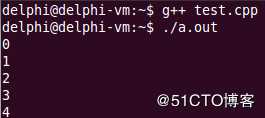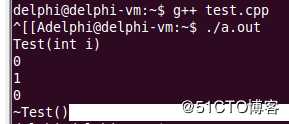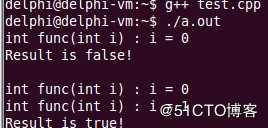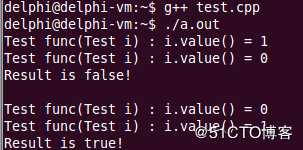标签:不用 space 语法 回收机制 比较操作符 生命周期 法则 替换 his
一.智能指针内存泄漏(C++主要的Bug来源)
1.动态申请堆空间,用完后不归还
2.C++语言中没有垃圾回收机制
3.指针无法控制所指堆空间的生命周期
代码示例
#include <iostream>
#include <string>
using namespace std;
class Test
{
int i;
public:
Test(int i)
{
this->i = i;
}
int value()
{
return i;
}
~Test()
{
}
};
int main()
{
for(int i=0; i<5; i++)
{
Test* p = new Test(i);
cout << p->value() << endl;
}
return 0;
}
运行的结果如图所示
可以看出输出结果如预期一样,但是指针在申请了内存之后没有进行释放,但当出现大量的数据时,程序会崩溃
智能指针的需求与目的
1.需要一个特殊的指针
2.指针生命周期结束时主动释放堆空间
3.一片堆空间最多只能有一个指针标识
4.杜绝指针运算何指针比较
解决方案
1.重载指针特征操作符(->)
2.只能通过类的成员函数重载
3.重载函数不能使用参数
4.只能定义一个重载函数
代码示例
#include <iostream>
#include <string>
//智能指针的实现
using namespace std;
class Test
{
int i;
public:
Test(int i)
{
cout << "Test(int i)" << endl;
this->i = i;
}
int value()
{
return i;
}
~Test()
{
cout << "~Test()" << endl;
}
};
class Pointer
{
Test* mp;
public:
Pointer(Test* p = NULL)
{
mp = p;
}
Pointer(const Pointer& obj)
{
mp = obj.mp;
const_cast<Pointer&>(obj).mp = NULL;
}
Pointer& operator = (const Pointer& obj)
{
if( this != &obj )
{
delete mp;
mp = obj.mp;
const_cast<Pointer&>(obj).mp = NULL;
}
return *this;
}
Test* operator -> ()
{
return mp;
}
Test& operator * ()
{
return *mp;
}
bool isNull()
{
return (mp == NULL);
}
~Pointer()
{
delete mp;
}
};
int main()
{
Pointer p1 = new Test(0);
cout << p1->value() << endl;
Pointer p2 = p1;
cout << p1.isNull() << endl;
cout << p2->value() << endl;
return 0;
}运行的结果如图所示
可以看到,指针在在对堆空间使用完之后,会自动释放内存
小结
1.指针特征操作符可以被重载
2.重载指针特征符能够使用对象代替指针
3.智能指针只能用于指向堆空间中的内存
4.智能指针的意义在于最大程度的避免内存问题
A.逻辑运算符的原生语义
1.操作数只有两种值(true与false)
2.逻辑表达式不用完全计算就能确定最终值
3.最终结果只能是true或者false
代码示例
#include <iostream>
#include <string>
using namespace std;
int func(int i)
{
cout << "int func(int i) : i = " << i << endl;
return i;
}
int main()
{
if( func(0) && func(1) )
{
cout << "Result is true!" << endl;
}
else
{
cout << "Result is false!" << endl;
}
cout << endl;
if( func(0) || func(1) )
{
cout << "Result is true!" << endl;
}
else
{
cout << "Result is false!" << endl;
}
return 0;
}

Q:逻辑操作符可以重载吗?重载逻辑操作符有什么意义?
代码示例及结果
#include <iostream>
#include <string>
using namespace std;
class Test
{
int mValue;
public:
Test(int v)
{
mValue = v;
}
int value() const
{
return mValue;
}
};
bool operator && (const Test& l, const Test& r)
{
return l.value() && r.value();
}
bool operator || (const Test& l, const Test& r)
{
return l.value() || r.value();
}
Test func(Test i)
{
cout << "Test func(Test i) : i.value() = " << i.value() << endl;
return i;
}
int main()
{
Test t0(0);
Test t1(1);
if( func(t0) && func(t1) )
{
cout << "Result is true!" << endl;
}
else
{
cout << "Result is false!" << endl;
}
cout << endl;
if( func(1) || func(0) )
{
cout << "Result is true!" << endl;
}
else
{
cout << "Result is false!" << endl;
}
return 0;
}
可以从代码及运行结果可以看出,无论逻辑操作符是否更换两端顺序,都会对两端数据进行运算
B.问题的本质分析
1.C++通过函数调用扩展操作符功能
2.进入函数体前必须完成所有参数的计算
3.函数参数的计算次序是不定的
4.短路法则完全失效
建议:实际工程开发中避免重载逻辑操作符,通过重载比较操作符代逻辑操作符重载,直接使用成员函数代替逻辑操作符重载,使用全局函数对逻辑操作符重载
小结
1.C++从语法上支持逻辑操作符重载
2.重载后的逻辑操作符不满足短路法则
3.工程开发中不要重载逻辑操作符
4.通过重载比较操作符替换逻辑操作符重载
5.通过专用成员函数替换逻辑操作符重载
标签:不用 space 语法 回收机制 比较操作符 生命周期 法则 替换 his
原文地址:https://blog.51cto.com/13475106/2412496